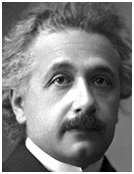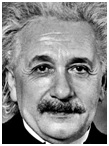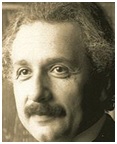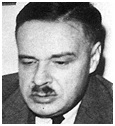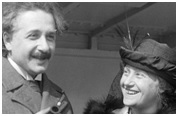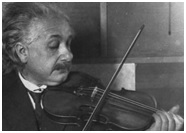|
 |
|
 |
|
|
||
Albert Einstein - Creativity and Science
Albert Einstein (1879-1955)
German-born American scientist (pictured right in 1921), who, as a Jew, fled from the Nazis. Voted person of the twentieth century by Time magazine.
Famous for... His Theory of Relativity (1905) and its equation: E=mc2 (where E = energy, m = mass and c = the speed of light). Relativity revolutionized science and made possible nuclear energy and nuclear bombs.
Why was he so creative? 1. Lifelong learning Einstein (pictured right in 1955):
“A man should look for what is, not for what he thinks should be”, he said. This is how he discovered the Theory of Relativity:
a) asking the right questions (see point 2). b) changing your assumptions Einstein thought the unthinkable, assuming even that Isaac Newton (pictured right) might be wrong - see point 4.
c) identifying the basic concepts involved “Everything should be made as simple as possible but not simpler”, he said.
d) gathering as much information about these concepts (from research and discussion),
e) making deductions (from basic concepts with intuition and imagination - see point 3).
f) using deductions to find solutions to a problem
g) communicating clearly He put his conclusions in language, everyone could understand. “You don’t understand something, unless you can explain it to your grandmother”, he said. 2. Continuous questioning Einstein (pictured right in 1921) always questioned everything. His Theory of Relativity started with a question he asked himself at 16 What would the world look like, if I rode on a beam of light? He eventually worked out the answer: time would stand still! He said, if you travelled 186,000 miles on a tram at the speed of light, this wouldn’t take a second but no time at all! Why? A clock, as you see it, won’t change, because the beam of light from the clock takes exactly as long as the time you’ve travelled. (remember the speed of light is 186,000 miles per second).
3. Inspiration and imagination His ideas on gravitation and relativity started with an inspirational idea, sitting in his job at the Patents
Office in Berne, Switzerland, in 1907 . If a man falls freely, he will not feel his own weight, Einstein (pictured right in 1904) thought. During that fall gravity doesn’t exist, and instead is replaced by acceleration (what he called the principle of equivalence). To solve problems, he brilliantly used his imagination. “Imagination is more important than knowledge”, he said.
4. Revolutionary The Theory of Relativity was revolutionary, rejecting some of Isaac Newton’s ideas like time being absolute (i.e. it’s the same everywhere). Einstein hated:
5. Perspiration He loved his work and thinking about it. “It’s not that I’m smart, it’s just that I stay with problems longer”, he said. He thought so hard that he lost himself in his work to the exclusion of everything else, including his family. He had a bad relationship with his sons, particularly Eduard, a schizophrenic (pictured right above). Once he even forgot where he lived! Work meant much more to him than his appearance, often giving lectures in an old sweater with slippers and no
socks! Money wasn’t very important to him. He wanted only $3000 p.a. for his job at Princeton University, but his wife, Elsa (pictured right together), got it increased to $13,000.
6. Relaxation This was important to refresh his brain. He particularly loved playing the violin (pictured right below), which he learnt from the age of seven. He worked so hard on the Theory of Relativity that he couldn’t think anymore. So he took a short break from it and then cracked it! 7. Purpose Einstein described himself as a “deeply religious nonbeliever” who was strongly motivated by;
This spirituality is what he meant by religion in his famous statement: “Science without religion is lame, religion without science is blind” . He believed in order in the universe, saying: “God does not play at dice” (so he wrongly rejected the chaos of quantum mechanics). Technological progress that is wrongly applied is: “like an axe in the hands of a pathological criminal” he said This is why he hated nuclear weapons. Einstein (pictured right) turned down the presidency of Israel, because he believed that
Key quotes on science and technology Science without religion is lame, religion without science is blind Science can only ascertain what is not what should be. Our technology has exceeded our humanity.
Key quote on the learning organization Once you stop learning, you start dying.
Key quotes on communication You don’t understand something, unless you can explain it to your grandmother. If you can’t explain it simply, you don’t understand it well enough. Everything should be made as simple as possible but not simpler.
Key quotes on learning A man should look for what is, and not for what he thinks should be. I think and think for months and years. Ninety nine times the conclusion is false. A person who never made a mistake never tried anything new.
Key quotes on creativity The important thing is not to stop questioning: never lose a holy curiosity. I believe in intuition and inspiration. Only daring speculation can lead us further and not accumulation of facts.
Key quote on knowledge management Imagination is more important than knowledge.
Key quote on change Life is like riding a bicycle. To keep good balance you must keep moving.
Key quote on business ethics Try not to become a man of success but try to become a man of value.
Key quote on work and leisure If A is success in life, then A equals x plus y plus z. Work is x; y is play; and z is keeping your mouth shut.
Key quote on relationships Only a life lived for others is a life worthwhile.
Key quote on the past, present and future Learn from yesterday, live for today, hope for tomorrow.
Key quote on decision making We can’t solve problems by using the same kind of thinking we used when we created them.
Key quote on wisdom The search for truth is more precious than its possession.
Key quote on careers If only I had known, I should have become a watchmaker (on making the atomic bomb possible). |
|
|
||
|
|
||
| Copyright © wisdomtowin.com 2025 All Rights Reserved | ||
|


